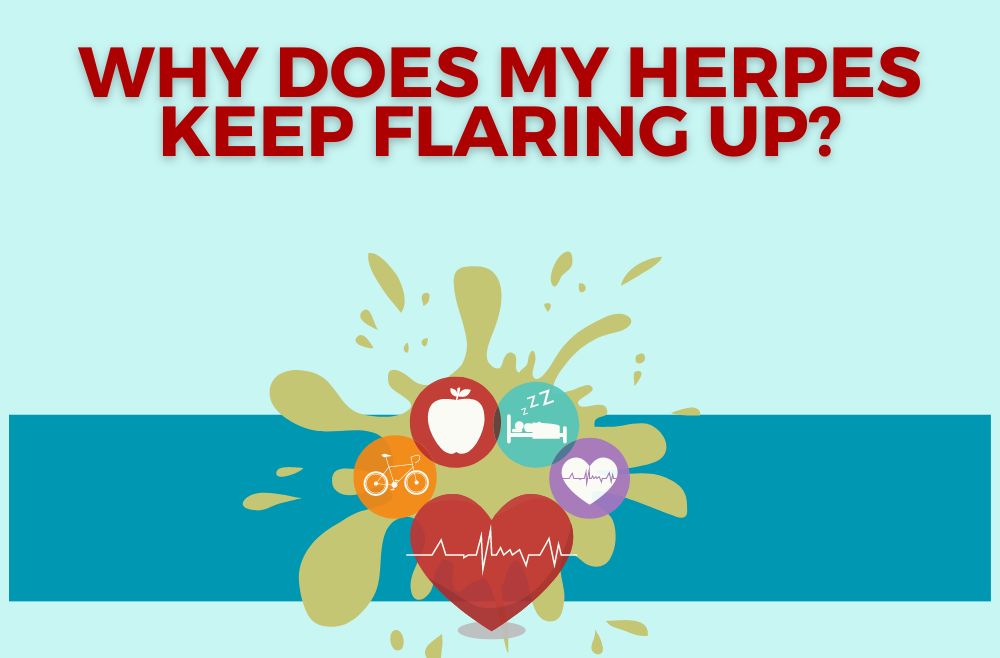The burning sensation of a herpes flare can feel like being stuck in a never-ending cycle. But understanding why your herpes keeps flaring up and how to manage it are key to finding relief. With the right knowledge, you’ll be able to take control of your flares and find peace of mind.
In this article, we’ll explore what causes herpes flares, how you can manage them, potential complications, prevention tips, and when you should talk to a doctor about your flares.
Key Takeaways
- Herpes flare-ups can be triggered by factors such as stress, immune system suppression, hormonal fluctuations, fatigue, and skin irritation.
- Emotional factors like fear or anger can also impact the recurrence of herpes symptoms.
- Seeking medical assistance is important to identify preventative measures and treatments to reduce the occurrence and intensity of flare-ups.
- Lifestyle changes, such as practicing stress reduction, maintaining a healthy diet, and regular exercise, can help manage and prevent herpes flare-ups.
What Causes Herpes Flares
You might be wondering what causes your herpes to flare up. Generally, any number of triggers can cause a herpes flare-up. These triggers include stress, immune system suppression due to illness or medication, hormonal fluctuations during menstruation or pregnancy, fatigue, and skin irritation.
In addition to these triggers, emotions such as fear or anger can have an impact on the recurrence of symptoms. It’s important to note that while some people may experience these flares frequently and intensely due to weaker immune systems, others may only rarely notice them at all.
Regardless of the frequency or intensity of your flares, you should seek medical assistance. This will help you learn about potential preventative measures and treatments that could help reduce their occurrence and intensity.
How Can I Manage Herpes Flares
To manage herpes flares, it’s important to practice diet control and stress relief.
Eating a balanced diet full of fruits, vegetables, and lean proteins can help keep your immune system functioning optimally. Additionally, limiting processed foods and sugary snacks may reduce inflammation associated with herpes flare-ups.
Reducing stress is also key in managing outbreaks since stress weakens the immune system and can lead to more frequent outbreaks. Taking time for yourself to relax through meditating or exercising can help reduce stress levels and keep flare-ups at bay.
What Are the Potential Complications of Herpes Flares
The potential complications of herpes flares may include skin infections, eye inflammation, and even encephalitis. These risks can be minimized with lifestyle changes such as:
- Avoiding contact with someone who has an active herpes infection
- Practicing safe sex by using condoms to reduce the chance of transmission
- Refraining from touching or scratching any existing sores on the body
Herpes is a viral infection that can cause uncomfortable outbreaks on the skin or mucous membranes. Although it is not life-threatening, left unchecked it can lead to more serious health issues such as encephalitis, which is an inflammation of the brain and spinal cord. Furthermore, if you have ocular herpes (eye inflammation due to herpes), there’s a risk of blindness if proper treatment isn’t sought out quickly enough.
In order to reduce your chances of experiencing these types of complications, it’s important to take steps like avoiding contact with someone who has an active infection and practicing safe sex through condom use. Additionally, refraining from picking at any existing sores can help protect against secondary bacterial infections that could result in scarring or other long-term damage.
How Can I Prevent Herpes Flares
Staying informed and taking proactive steps can help prevent herpes flares. To do this, it’s important to understand the potential triggers that may lead to a flare-up. Certain emotional triggers, such as stress or anxiety, can cause an outbreak of herpes. Additionally, dietary modifications have been known to reduce the recurrence of herpes symptoms.
| Trigger Type | Strategies for Prevention |
|---|---|
| Emotional Triggers | Identify personal stressors Develop relaxation techniques Practice stress management skills |
| Dietary Modification | Eat a balanced diet Limit intake of processed foods Maintain proper hydration levels Reduce alcohol consumption Avoid smoking |
When Should I Talk to a Doctor About Herpes Flares?
If you feel that your flares are becoming more frequent or intense, it may be time to talk to a doctor about potential treatments.
Home remedies and alternative medicine can provide temporary relief from herpes flares. There are natural solutions to herpes that have proven to be very effective.
A doctor can provide advice on lifestyle changes such as reducing stress levels, exercising regularly, and eating a healthy diet.
Finally, they will be able to monitor your progress over time, making any necessary adjustments in treatment as needed.
Talking to a doctor about your herpes flare-ups is important if symptoms start getting worse or become unmanageable at home with home remedies or alternative medicine options. Your doctor will have the expertise and resources needed to help you get back on track with managing your condition properly.
What’s Next?
It’s important to understand why your herpes keeps flaring up and how to manage it. With the right care, you can significantly reduce the number of outbreaks you experience.
Research shows that people with herpes are able to reduce their flare-ups by up to 80% with proper treatment.
Don’t be afraid to talk to your doctor about any concerns or questions you may have regarding your flares. Remember, knowledge is power when it comes to managing herpes flares and keeping them under control.

